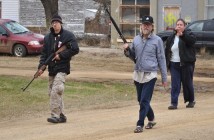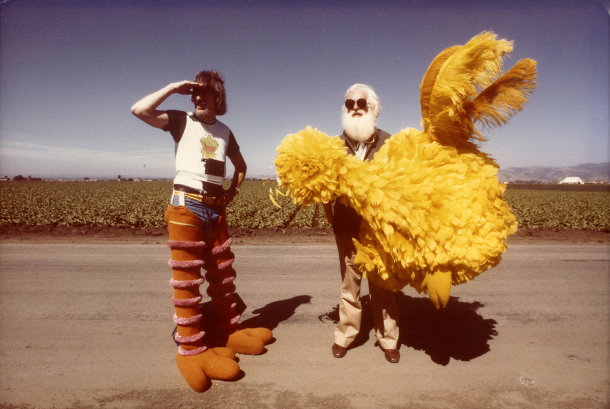A Prairie Home Companion (2006)
Cast: Lily Tomlin, Meryl Streep, Woody Harrelson
Director: Robert Altman
Country: USA
Genre: Comedy | Drama | Music
Official Site: Here
Editor’s Notes: The following review is part of our coverage for TIFF’s Company Man: The Best of Robert Altman. For more information on upcoming TIFF film series visit http://tiff.net and follow TIFF on Twitter at @TIFF_NET.
Robert Altman never really slowed down throughout his entire career. He made masterpieces in the 70s, 80s, 90s and 2000s right up until his death in late 2006. He made films unique to him, his stamp was on everything he did from M*A*S*H* through his final film A Prairie Home Companion. For this final film (though from what I have read about him, I’m sure he figured he still had 5 more films in him before he died), he chose a screenplay written by Garrison Keeler, author, humorist and creator and host of the long-running Public Radio show A Prairie Home Companion, which was his first and so far only feature screenplay (though he did write for some Prairie Home Companion television specials and a short lived series of the same name).
Altman had a way of making a film seem rigorously planed but completely spontaneous at the same time, and that is really on display here.
The story is that this is the last broadcast of The Prairie Home Companion, based out of Minnesota, because a large company bought the mom-and-pop station and is cleaning house. The show’s been on for over 30 years, but that doesn’t matter. We get all this from a film noir type voiceover by a man named Guy Noir (played here by Kevin Cline in one of his funniest roles in many years, but the character on the radio program is voiced by Keeler himself). He speaks in this noir-speak exclusively and no one thinks it odd. Most of the film then centers on the fact that this is the last show, the reactions from the talent backstage all while the show is proceeding onstage.

Altman intercuts the show, progressing as normal with the backstage conversations of singing act The Johnson Sisters, Rhonda (Lilly Tomlin) and Yolanda (Meryl Streep) and Yolanda’s daughter Lola (a pre-rehab and still talented Lindsey Lohan), the antics of Lefty (John C. Reilly) and Dusty (Woody Harrelson), a cowboy musical act that often gets in trouble for their suggestive lyrics, as well as Chuck Akers (the legendary L.Q. Jones) who is described by GK (Garrison Keeler) to be the scourge of mature ladies everywhere. Also in this backstage mix is, as reads the credits, Dangerous Woman (Virginia Madsen). She gives a couple names for herself, but the point is she is an angel of death and Guy Noir’s personal mystery and romantic pursuit.
For the show portions, it features regulars from the real radio program as well as songs from all of the primary actors. The show itself is pretty good and very funny because of the local commercials Keeler does. All the songs are really good, mostly old folk and country songs with some originals thrown in for Dusty and Lefty (the Bad Jokes song is a particular stand-out). All of this is anchored by Keeler who adopts his radio personality and just carries on the show.
Backstage, when Keeler talks he always launches into a story about how he got started in radio and every story is different. They get jumbled and confused and only Lola calls him out on them and forces him to connect the stories because she seems to be the only one who has ever listened to all of these stories, having been brought to the show most of if not all of her life, her mother and aunt being regulars and her deceased father who was a friend of GK’s.
A Prairie Home Companion is about more than a radio show. It’s about continuing on in the face of the end and how we greet that end when it arrives.
Keeler seems like a natural in this film, also his first and so far only. He holds his own with Streep, Tomlin, Kline et all and never seems to be anything more than relaxed. His screenplay captures the soul of his beloved radio program, though it does excise the stories of Lake Woebegone and others, presumably to keep the film rolling since there are enough stories and threads, we didn’t really need him telling them onstage too. Keeler is really the anchor of the film and despite the magnitude of talent in the film, it just wouldn’t have worked without Keeler and without his easy, relaxed charm. He’s the glue that holds this chaotic masterpiece together.
I don’t actually know how much of Keeler’s screenplay survives onscreen though. I’ve written before that Altman had the tendency to have someone with the script there and have the actors just riff in character and when the scene was done, he’d turn to the script person and say “Did we get everything we needed for the plot?” and if they did, they’d move on and if not they’d retake with some notes to the actors. If I had to guess, I’d say the backstage scenes were done in that fashion but the stage things were likely mostly as written. Altman had a way of making a film seem rigorously planed but completely spontaneous at the same time, and that is really on display here. The fil wouldn’t have worked if it was all just improvised and people were everywhere, and it wouldn’t have been as charming if it had been controlled beat by beat and word for word. Altman is the only person who ever manage to balance these two disparate styles and his films were unique as a result.
Then there is the music. Each song is performed with gusto and lively passion that you’d think these actors were the singers, just grinding out dates because the y never made it really big and this show being the only place they really had exposure and a fan base. Every one of them can sing well, and the showstopper was Lola’s semi-improvised version of the folk/blues standard Frankie and Johnny (sometimes known as Frankie and Albert). She can’t remember the words so she riffs on some of the themes and it ends up being laugh-out-loud funny for anyone who knows the real versions of the song.
In many ways, this is a fitting end to the career of Robert Altman. A Prairie Home Companion is his most focused film in the later portion of his career and also his funniest film since the 90s. Ultimately he was a comedy director, though his dramas were equally good and none of his comedies are without tragedy. He made two duds for every masterpiece but when you think about it, he seldom made just a good film. He either went big and scored a masterpiece or went even bigger and made something that was nearly unwatchable (which all of his bad films are just messes, attempts to recreate his best work and just never coming together). But he was never deterred and would always come back swinging. A Prairie Home Companion is about more than a radio show. It’s about continuing on in the face of the end and how we greet that end when it arrives. So in a way, it’s about life and how we deal with death and what we do with our lives even though we know we will die someday. Do we get hysterical and make long, weepy speeches or do we carry on knowing what’s coming but also knowing we can’t stop it so we hope we’ve done well and wait to see what, if anything is on the other side?
In many ways, this is a fitting end to the career of Robert Altman. A Prairie Home Companion is his most focused film in the later portion of his career and also his funniest film since the 90s.



